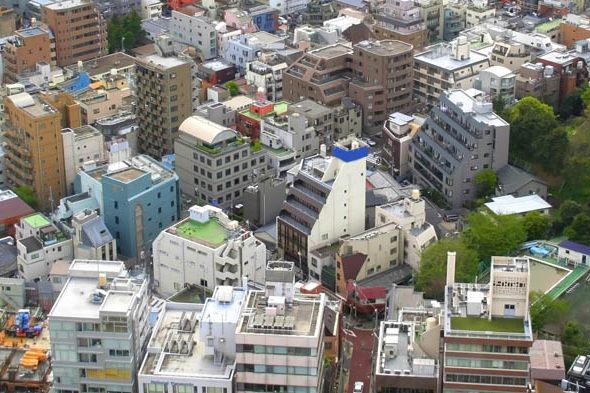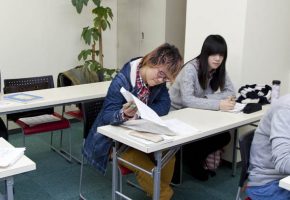Daily Archives: October 22, 2016
- all
- Pop Culture
- Preparation
- Time in Japan
- Tokyo Things To Do
- Travelling
- Working

World Unite! offers a very useful support package for those who plan to do a Working Holiday in Japan. They run an office in central Tokyo with a multi-cultural and multi-lingual support team that has been supporting hundreds of foreigner on their Working Holiday in Japan. You can make use of their support for a full year while being in Japan. The cost of the package is 800 EUR/850 USD and can be booked here. It includes: Preparation documents (PDFs and videos) – including all kinds of practical information for your life in Tokyo Intercultural Training via Skype with an intercultural trainer Arrangement of accommodation at shared houses at preferred rates (dorm bed at 35,000 JPY per month). On arrival, pick up from Haneda or Narita Airport by public transport and drop to accommodation On-site assistance including: Immigration Department (Residence Card) Residents’ Registration Office Tax number Opening a bank account and mobile phone contract Japanese Language Course. We can either book you into a formal language school and/or we can introduce you at the nearest Community Centre and/or help you to find a tandem partner and/or one-to-one Japanese language tutor (language lessons at extra cost) Local orientation Assistance with finding a job Help with job application in Japanese (preparing your CV/resume in Japanese) Tips and Preparation for job interview Registration at the employment office Providing job offers from other sources Use of PC and printer for researching job offers and creating application documents Multilingual Contact persons on site (English, German and Japanese) for any assistance during your whole year in Japan, even if you are at other cities in Japan, incl. e.g. support with travel, accommodation, finding job etc. at other cities in Japan; at our office, via phone, Whatsapp, Line, Email... Membership Terms for cheap foods on wholesale
What are cultural differences? Culture, the way Intercultural Coaches usually define it, is describing the way how the people belonging to a certain group, such as a nation, think. The thinking is influenced by values and norms that the people belonging to the group share. Of course not everyone of a certain country thinks the same way, indeed there are big differences from one individual to another, but tendencies definitely exist. They exist because the people around oneself are influencing each other: in their childhood, children learn the values, the way of thinking and behavioural norms from their parents, educators and teachers. Later, through every interaction, in social life, in work life etc. people adapt their thinking and behaviours to the people around them - resulting that they are a little similar to the people they interact with or they have grown up with. Japan is still a relatively closed society. As an isolated island with still today, very few foreigners, a culture has developed in Japan, which is indeed unique and in many aspects very different from all the other cultures in the world. Most people in Japan are proud of their culture and want to preserve it. There is not so much the urge to adapt cultural features from other nations. Being unique, however means that there are considerable differences between Japanese culture and the rest of the world. If you are not familiar with these differences and you closely interact with Japanese people, for instance living with them in a host family, or working with them at your Working Holiday job or internship, can result in difficulties for both sides. It is therefore definitely recommendable to learn about Japanese culture prior to your trip to Japan. Once you have are familiar with it in theory, you will be sensitized and able to understand certain behaviours you can observe in Japan, and you can adjust your own behaviour accordingly to avoid possible pitfalls. Japan Explained Through Cultural Dimensions A very useful analytical tool to study cultural differences is Hofstede's 6D model of culture. The model identifies six key dimensions by which cultures differ and through comparison, serves as a good representation of differences. The dimensions described are power distance, individualism vs. collectivism, masculinity vs. femininity, uncertainty avoidance, pragmatism vs. normative and indulgence vs. restraint. The Hofstede Centre has a powerful tool on its website, allowing you to compare your own culture with Japan. You will notice in which dimensions you can possibly expect bigger cultural differences and learn how people in Japan would typically position themselves: https://geert-hofstede.com/japan.html You can also book an online intercultural skype training session with World Unite! (available in English and German), which takes around 90 minutes, and where you can learn from and also ask your questions to an experienced academic consultant (intercultural coaches, japanologists) about anything related to Japanese culture and/or living and working in Japan. To join is 45 USD/EUR. The sessions are usually offered 1-2 times per month to a group of around 4-10 participants, most of which go to Japan on a Working Holiday or Internship. It would be good to contact World Unite! latest around one month prior to your proposed journey to Japan. Even if you are already in Japan, it might make sense to join the session. Yes, I want to book an online intercultural skype training session about living and working in Japan!
You can buy most things in Japan. However, some items might be considerably more expensive than back home, or if you only need them occasionnaly (such as formal clothes for job interviews) not worth to buy again, if you already own them back home. Here's our Working Holiday Packing list: Passport with Working Holiday Visa Credit Card and some cash for the first month(s) Insurance documents Vaccination record Photocopies of your documents (in case of loss) Casual clothes for all seasons Formal clothes for Job Interview. For males this should be: black or dark blue fabric pants, long-sleave conservative shirt, tie, dark conservative leather shoes. A suit including the jacket is not an absolute necessity, but if you have one, better bring it, but only if it is plain black or dark blue - no fancy colours or patterns. For women: black or dark-blue knee-long skirt with black or skin-coloured tights (alternatively it is also acceptable to wear a dark, conservative fabric pants - no jeans!), white/neutral formal blouse. For job interviews, women should NOT wear colourful make-up, attention-catching accessories or have fancy hairstyles. Also men should not have unusual hairstyles or beards. It is possible to buy even large sizes of clothes in Japan. Shoes (particularly if have large sizes they are difficult to find in Japan) Towels (usually not provided at share houses) Western brands of cosmetics, toothpaste etc. that you prefer over Japanese brands. Western brands of cosmetic products are not widely available in Japan. If you need certain prescription medicines, better bring supply for your whole duration of stay. Also bring the prescription to proof that it is for your personal use if asked for at customs. Cell phone which is not sim-locked by your domestic provider with charger Maybe (for the beginning) some durable Western food (e.g. sweets, chocolates, bread, pasta). Remember that it is not allowed to bring fresh fruits and meat products to Japan. Using foreign electrical devices in Japan Japan uses the same AC sockets and plugs as in the US and runs its electrical network on 100 V/50 Hz. For eletric devices from other parts of the world, e.g. Europe, you need AC adaptors. It is not necessary to bring AC adaptors from home, as you can cheaply buy them at all electric goods shops. Salespeople at shops of your home country often recommend the wrong type of AC adaptor for Japan. Please note that due the 100 V low voltage of the Japanese electrical network, flat irons, hair dryers, kettles and most other heating devices from countries of higher voltage (e.g. Europe uses 220-250 V) won't work in Japan, even when using an adaptor. So don't bring them. Notebook computers, smartphones, electric shavers etc. can usually deal with a high range of voltages (100-250 V) so you can use them. Check the label on your electrical device for clarification.

It is a requirement for most nationals to have a Travel Health insurance for the whole duration of their time in Japan in order to get a Working Holiday Visa. The following insurances are recommended: Travel Health Insurance (obligatory). This insurance will cover your expenses for medical consultation, treatments and prescription medicines. Also it usually pays for a flight back home, should it be necessary from a medical point of view, if confirmed by a doctor in Japan. As a Working Holiday traveller, staying for up to one year in Japan, you can also join the Japan National Health Insurance (国民健康保険 Kokumin-Kenkō-Hoken), but you don't have to. You would need to pay for it an amount similar to foreign travel health insurances, but the Japan National Health Insurance only covers 70% of the medical costs, whereas foreign travel health insurances often cover 100%. As medical costs are relatively high in Japan, even the remaining 30% can make a substantial amount. Travel cancellation insurance. If you cannot travel to Japan after having made all travel arrangements due to a serious reason (e.g. serious illness, pregnancy etc - please check the conditions of the insurance), the travel cancellation insurance will reimburse your expenses. Travel cancellation insurances often need to be bought a certain time (e.g. one month) prior to your booked departure date. Liability insurance. As most companies in Japan have an employer’s liability insurance for their employees, this is often not necessary for those who are on a Working Holiday. In any case, please make sure what such liability insurance covers. In some cases, travel liability insurances are limited to liability claims related to travel activities (e.g. if you cause damage to a hotel room, rental surf board etc.), and don't include work-related liability claims.

Japan has a well-developed medical system of high standard, even in small towns. It might be hard at times to find English-speaking healthcare professionals though outside the big cities. Even in Tokyo, if you cannot fluently converse in Japan, options are limited, but available. “St. Luke's Hospital“ and the “Roppongi Midtown Clinic“ are two English-speaking hospitals in Tokyo that feature many medical specialties. As the prescription drugs sold in Japan are mostly made in Japan by Japanese pharmaceutical companies, and foreign medicines are not available, medication might considerably differ from the one you might be familiar with. Almost all drugs need a prescription and there are very few ones you can just buy at a drugstore. If you regularly need prescription drugs, we advise you to bring them from home for your whole duration of stay. Also bring the actual prescription with you, to proof that they are for your personal use. You might be asked at customs to show this. No vaccinations are required by law to enter Japan. Japanese encephalitis, a viral infection transmitted by mosquito bites, might be a risk in the countryside during the summer months (May to October). If you plan to stay in rural areas (e.g. doing farmwork) during these months, you might decide to get vaccinated against it.
Requirement 1: Have a Japanese bank account for your salary If during your Working Holiday you want to do remunerated work, you typically need a Japanese bank account, as employers don't pay out salaries in cash or to foreign bank accounts. There are only a few banks in Japan that open bank accounts for foreigners from the beginning of your stay. Most banks won't do it at all and some only after you have spent at least 6 months in Japan. The banks that open accounts from the beginning of your stay have further restrictions about new accounts, e.g. usually you cannot transfer funds from outside of Japan to your Japanese account within the first 6 months of your stay. Requirement 2: Bring a Credit Card from home So to avoid you have to bring a lot of money in cash and in order to cover your living expenses before you get paid out for the first time, which usually happens on a monthly base after having done the work, it is advisable to bring a credit card from your home country with you. You also need a Credit Card in order to get a mobile phone contract. At some, but not all mobile phone providers this can be a foreign credit card. There is no chance for anyone who is on a Working Holiday visa to get a Japanese credit card. Also it important to know that many ATMs don't accept foreign Credit Cards, even if they have the VISA or Mastercard logo. They only work with VISA and Mastercards issued in Japan. At areas where there are usually many tourists, you can find ATMs accepting foreign-issued credit cards (and even some foreign debit cards such as Maestro and Visa Plus), and also at Japan Postbank and 7Eleven Convenience stores.

Living costs in Japan and especially in Tokyo are known to be among the world's highest. Japanese apartment sizes are usually smaller than in most other industrialized nations. In Japanese big cities, you will find modern skyscrapers and residential complexes, which are of very high standard and technologically very advanced, but there are also many houses, which look relatively simple and old-fashioned, if not to say „shabby“. For many Japanese, housing seems not to be a priority, and they prefer to spend their money on other things, such as food or cars. Anyway, even the small and „old“ houses in Tokyo are very expensive to buy or rent, as space is very limited and demand is high. However, there are ways to enjoy Tokyo without spending a fortune. The following accommodation options are feasibile for those who are on a Working Holiday: Share Houses “Share Houses“ are simply put, houses that you share with others. Even for many (young) Japanese, it is very common to live in a share house. They prefer it to staying at a small apartment on their own, because it is not only cheaper, but also offers other amenities, such as shared installations, common areas, and getting to know like-minded people. The term "social housing" exists in Japan, meaning that you share the house with other people of the same interest, e.g. "Rock music". Such houses would then have for instance a common collection of records or music instruments. There are several chains of share house companies in Japan. Some chains manage hundreds to thousands of small single-family houses with 4-5 rooms. You would share bathroom, kitchen and living room with the others sharing the house with you. These houses are often old-fashioned or even not well maintained in terms of sanitary installations, furniture, interiour design etc. Some other chains run large houses with 50-100 rooms that typically previously belonged to large companies that used these buildings for their employees. Such share houses exist from simple standard to luxury standard. The luxury share houses even have shared movie theater rooms, libraries etc. Share houses sometimes have quotas of how many Japanese and how many Westerners they want to accept. A dorm bed at a share house in central Tokyo is about 45,000-60,000 JPY per month. Single rooms are between 80,000-100,000 JPY. Cheaper options exist, but are often either very tiny, of very low standard, or you would have to share the dorm room with 12 or more people. If you stay in Yokohama, Saitama, Chiba or in the very West of Tokyo prefacture, rents are around 25-30% cheaper, but if you have to commute to central Tokyo every day for your work or language lessons, you don't really save, as commuting expenses apply (and commuting times of 60-90 minutes one-way). In other larger cities (e.g. Osaka, Nagoya) the rents are similar, but the rooms might be more spacious than in Tokyo. In smaller cities or in the country side, Share Houses might not exist. Host families Staying with a host family gives you the opportunity to practice your Japanese language skills and to get first-hand cultural learning experiences. On weekdays the Japanese host family usually offers you breakfast and dinner, whereas on weekends (Saturday and Sunday) they also provide lunch. Typical host families are usually composed of parents in their 20s or 30s with one or two small children, or they are in their 50s or 60s when their children have already left the parental household. Usually you don't find host families in central Tokyo as spaces are too limited to accommodated guests, but they would rather live in Chiba, Yokohama, or Saitama, Staying with a host family would typically cost you around 80,000-85,000 JPY per month. If you work or attend language lessons in central Tokyo, you would have to add commuting costs. Apartments In Japan, as a foreigner who stays for a limited duration of time only, it is not so easy to rent an apartment on your own. The reasons are that first, usually many landlords won't rent to foreigners as they expect language barriers, cultural differences etc. that just seem to much unnecessary complication to them if they can also rent to a Japanese. Second, landlords usually want to see that you have an unlimted fully salaried work contract, that you won't have if you are on a Working Holiday. Third, the minimum contract duration of renting an apartment in Japan is typically one full year. Fourth, you would have to pay a high procuration fee (reikin) to the real estate agent, which doesn't make too much sense if you stay for a relatively short time only. Fifth, most apartments come unfurnished, so you would have to buy all of your furniture.
What about the finances? As the salaries in Japan are relatively attractive, it is possible to finance your entire trip including living and travel expenses through the work you do in Japan. Many people achieve to even save some money, for instance to travel around and explore Japan or neighbouring Asian countries. However, you need some money before starting your trip, because when applying for the visa you need to have a flight ticket and you need to proof you have an amount of around 1500-2000 EUR/USD (depending on your nationality). You should be able to cover your living expenses for at least 1-2 months, just in case you don't find a job immediately. Let's have a look at the finances in detail! On the cost side, you have to consider: Your flight to Japan and back (you can use a flight comparison website to check rates) Rent for your accommodation: A dorm bed at a share house is usually around 45,000-60,000 JPY per month, a single room around 80,000-100,000 JPY. If you find considerably cheaper options in central Tokyo, room sizes are usually extremely tiny, the standard is poor, or they pack many people into a dorm room. You can find cheaper accommodation if you are willing to commute for around 60-90 minutes, but in this case you will have higher commuting expenses, which means you will probably not save a lot. Food and other living expenses (e.g. public transport). For Tokyo you should calculate with a minimum of around 280 EUR/300 USD per month (if your accommodation and job are in central Tokyo) Travel health insurance (around 40-50 EUR/USD per month) The services of an organization helping you: World Unite! for instance charge a one-time service package fee of 800 EUR/ 880 USD. The services included will definitely help you not only to save time to make all arrangements, pre-arrival and in Japan, but might help you to actually save money in Japan by avoiding (costly) mistakes, by finding cheaper accommodation, by getting membership terms on cheaper food on wholesale, and by helping you to find a job quickly. On the „income“ side, with the typical Working Holiday jobs, you will make (in Tokyo) between 890 and 1500 JPY per hour. So if you work part-time (28 hours per week), that’s around 100,000 to 170,000 JPY per month. If you work full-time (40 hours per week), we’re talking about 140,000 to 240,000 JPY per month. If you have a good level of Japanese and/or some professional qualification (particular IT or engineering-related, or as a professional teacher of English as a foreign language), you can make a higher hourly salary than the range stated above. With the help of an organization, it is realistic for most participants to find a job within their first month, so you should have enough money to cover one month without any job while doing job hunting. Now you can calculate how long it will take you to „break even“, which usually happens in the 4th month. So, from this moment your total earnings will exceed the total costs and many participants are actually able to save money that they can then use to travel around or to take back home.
The Working Holiday Visa The “Working Holiday Visa“ is currently available if at the time of application you are 18-30 Years old and if you are a citizen of the UK, Ireland, New Zealand, Germany, Austria, France, Denmark, Norway, Iceland, Portugal, Spain, Hungary, Poland, Slowakia, Czech Republic, Lithuania, Argentina, Chile, Taiwan, or Hong Kong. Citizens of Australia, Canada and South Korea can get the visa if they are 18-25 years old. You will have to prove a certain amount of money on your bank account, which might be lower if you hold a round way ticket and higher if you only have a one-way flight ticket to Japan. The exact amount differs depending on your nationality. It is typically in the range of 1500-2500 Euros/USD. Also, you can not be accompanied by dependents or children, you should be in good health and not have any criminal records. Please check the exact visa requirements on the website of the Japanese embassy of your country. With the Working Holiday Visa you can accept any remunerated job in Japan, except for jobs that "affect public morale in Japan", which include jobs in the gambling industry, and in bars, nightclubs or any other establishments where services related to the sex industry are offered, even if you are doing some other type of work at such establishment (e.g. if there are sex workers present at a bar, you are not allowed to clean there or to sell drinks etc.). With the Working Holiday Visa in your passport, you will get a Residence Card on arrival at the airport in Japan. Alternative options For nationalities and age groups that cannot get the Working Holiday Visa, an alternative solution to do something similar to a Working Holiday can be the use of a Student Visa. You can get a Student Visa if you enroll for at least 20 hours per week in Japanese language lessons at a Language School that is accredited to apply for Certificates of Elegibility for a Student Visa. The language school can then also apply for a Work Permit for you, which is usually granted if you get a Student Visa. This Work Permit allows you to work for up to 28 hours per week. These 28 hours are calculated as an average, so you can for instance, during your language lesson's semester breaks work full time, and then work a lower amount of hours while you take the language lessons. You can for instance book language lessons with World Unite! in order to get your Student Visa with Work Permit and then make use of their Working Holiday support services.

Experience life with a Japanese family as an Au Pair As an Au Pair you live with a Japanese family for a couple of months. You are supposed to look after the family's children and support doing the household while the parents are at work. You usually receive some pocket money, along with food and accommodation. Finding an Au Pair job in Japan can be difficult because many Japanese families are unfamiliar with the concept and often scared to allow a stranger penetrate into their privacy. There are some agencies offering Au pair jobs in Japan though. It is usually required to have childcare experience to be accepted into their programs. The host families they arrange for foreign Au Pairs to be placed at, are typically residing in villages or small towns, but not in the big cities, because in large cities such as Tokyo or Osaka, apartment sizes are small and there is usually no space to accommodate another person.
Learning Japanese at a language school The most intensive and fastest method to improve your Japanese language skills, is to join a language course at a language school. Attending a language course can be your main reason to travel to Japan, or you can also add some language lessons to your Working Holiday or Au Pair experience. Many nationalities can book Japanese language lessons at formal language schools for up to 90 days (but not get involved in remunerated work) on a regular Temporary Visitor Status that they get granted for free on arrival in Japan. Citizens of the UK, Ireland, Austria, Germany, Switzerland and Liechtenstein can easily extend this status by another 90 days once in Japan. If you are of different nationality or you plan to come to Japan for language lessons longer than the time you get Temporary Visitor Status for OR if you wish to finance your stay in Japan through part-time work in Japan, this is possible on a Student Visa. Some (but not all) language schools are accredited to apply for Certificates of Elegibility to get you a Student Visa. With the Student Visa you can stay in Japan for as long as you are enrolled at full-time language lessons and you can also apply for a Work Permit, allowing you to work for up to 28 hours per week. These 28 hours per week are calculated as an average during your whole duration of stay, so you can for instance work full-time during a semester break and then work less hours while you are attending language lessons. Language schools offer the most intensive and effective way of learning Japanese. Besides attending lessons, you are expected to do our homework, and most language schools proceed at a relatively fast pace, so you need to put effort into studying the language. Book language lessons in Tokyo now! Which other options exist to learn Japanese in Japan? Other options besides formal language schools are to attend Community Centres and to learn Japanese with a Tandem Partner. Community Centres offer low-cost language lessons, offered by volunteers. There are language lessons targeting foreigners living in Japan, wanting to learn Japanese. They are offering classes around 1-3 times per weeks. Often it is necessary to prove that you are a resident of the ward where the community centre is located to be allowed to join the lessons at the Community Centre, so this option is not possible if you are on a Temporary Visitor Status. A Tandem Partner is a Japanese person who wants to learn your native language and in exchange teaches you some Japanese.
An internship in Japan is an investment into your professional future Internships are usually done by students or graduates to get practical work experience, applying the theory they learn at university in a real life work environment. Many students want to do an internship abroad to expand their global and intercultural skills. Unfortunately, the idea of doing a student internship is not very common in Japan. Japanese students, while attending university usually don't aim at getting practical work experience, but they learn about real work only after graduation when entering a company at an entry-level position. It is still the idea of many of them to stay with the same company thoroughout their professional life. As a consequence, many Japanese companies, particularly those with a more traditional mindset, don't see the point why a student wants to be with them for a limited duration of time only, and they don't see the reason why to spend effort into training someone who would leave after short time anyway. As a consequence, it can be really difficult to arrange an internship in Japan. There are agencies that arrange internships in Japan, but you need to expect to pay a relatively high amount of money to use their services. Also, internships in Japan are often not paid, or companies only pay a small living support such as reimbursing your commuting or accommodation costs. With the visa categories issued for internships (e.g. Cultural Activities Visa) it is also legally not allowed to have an income in Japan. It is usually not possible to finance your trip, living expenses and possibly ageny placement fees with the stipend you get for your internship. You should therefore see an internship in Japan as an investment into your professional future.

What are Working Holidays? Working holiday programs are based on bilateral agreements between Japan and partnering countries, making it possible for young nationals of the partnering countries to travel to Japan for a duration of 6-18 months (depending on the nationality), primarily for the purpose of spending holidays which have the aim of cultural learning and exchange, but also allowing them to legally engage in employment with the purpose of supplementing their travel funds. Typical Working Holiday Jobs are jobs in restaurants, cafés and hotels, sales jobs in shops, nanny & au pair, English teacher, sports instructor, farm work, light factory work etc. However, legally (almost) any jobs are possible. In Tokyo, these jobs are typically remunerated with around 890-1500 Yen/hour. At other cities, the salaries are slightly lower, but also living expenses are lower. So if you work part-time (28 hours per week) or full-time (40 hours per week) you can have a relatively good income, which allows you not only to cover your living expenses, but even to save some money, for instance to travel around or to pay for Japanese language lessons. lf you have some professional qualification and/or you have better skills of the Japanese language, you can find jobs with even a higher salary. Contrary to the "roadtrip" concept of Working Holiday like it is common in Australia and New Zealand, where you would travel around all the time and do constant job hopping, in Japan due to the expectations of employers that you stay with the company for a longer time, it might make more sense to plan your stay in Japan in a way, that you don't stay for less than 3 months at one place. It is simply often not feasible to find jobs for a short duration of time only. So if you stay for a full year in Japan, it is advisable not to plan to stay at a total of more than 4 locations if you intend to find remunerated work. To explore more parts of the country, you can travel around in between jobs or during weekends and public holidays. Who can do Working Holidays in Japan? The Japanese Working Holiday Visa currently exists for nationals of the UK, Ireland, Australia, New Zealand, Canada, Norway, Denmark, Austria, France, Portugal, Poland, Slovakia, South Korea, Taiwan and Hong Kong. You must be between 18-30 years old by the time of applying for the visa (for some of above mentioned nationalities it is only 18-25 years) and you have to proof you are able to afford the trip. You apply for your Working Holiday Visa before leaving for Japan through the Japanese embassy (or consulates at some countries) at your home country. Even if you can’t speak any or only little Japanese, it is still possible to find a job, but the better your Japanese language skills are, the easier it is. It is always a good idea to attend Japanese language lessons while in Japan though (and prior to your trip). How can I find a job in Japan? The usual steps for Working Holidays in Japan are: 1) to apply for the visa at your home country; 2) to travel to Japan and sort out all formalities that Japanese employers usually require such as registering as a resident, getting a tax number, opening a bank account, and getting a mobile phone contract, and 3) to find a job once you have arrange all of this. It is difficult to secure remunerated jobs from abroad, as potential employers usually want to see that you have a visa which allows you to work in Japan, that you have a Japanese tax number, a bank account where they would pay the salary, and a phone number where they can reach you at. As many things are done completely differently in Japan than at your home country, plus there might be a possible language barrier as English is not wide-spoken in Japan, it might be a good idea for you to use professional support services to assist you with the formalities and to land a job. As an extra service, agencies might also be able to pre-arrange certain jobs prior to your arrival. The leading provider of Working Holiday support services in Japan, with a multi-lingual support team in Tokyo, is World Unite!. Besides providing support services such as sorting out the necessary formalities and helping to find jobs in Tokyo, World Unite! also pre-arranges jobs at ryokans (traditional Japanese hotels), (Western-style) hotels, ski-resorts and farms all over Japan and they run an attractive and affordable share house in central Tokyo. Read more about World Unite!'s Working Holiday support in Japan: Working Holiday in Tokyo Working Holiday jobs at ryokans, hotels and ski resorts Working Holiday jobs at farms World Unite! Share house in Tokyo








